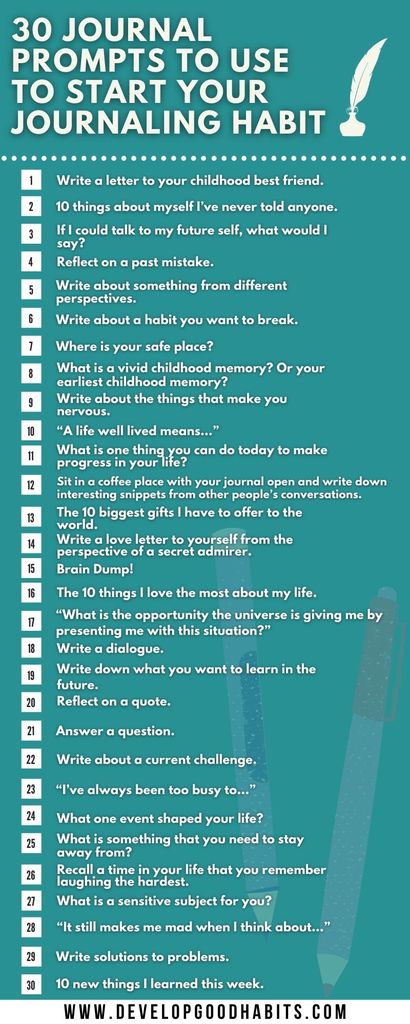Journaling is a popular activity for people these days, and rightfully so. Having a place to dump all of your stressful thoughts and do some self-reflection can be a very cathartic practice.
However, if you’re like me, this may be one of those habits that you get really gung-ho about by going out and getting all of the supplies that you need while promising yourself that you’re definitely going to stick to this habit…
And then a week later you have some special journaling pens that you haven’t taken out of the packages yet, a journal bookmarked on page 3, and a long-lost memory of your enthusiasm. You wrote for 3 days, nothing happened, and then you took a day off…and then kind of forgot about the whole idea.
But, you know there are benefits to journaling so you’re probably looking for a way to stick to this habit long enough to make it part of your routine. You need an external force to drive you to complete this task every day.
You know we like 30-day challenges here on DGH, so in this article, we are going to teach you how you can build a journaling habit, and then give you 30 prompts to use for your first 30-Day journaling challenge.
So let’s take a look at how you’re going to make your journaling habit into an integral part of your life.
How to Create a Journaling Habit
First, I want to empathize with you about the fact that turning an “every now and then” journaling hobby into an actual habit can be hard.
People often only turn to their journal when things are going extremely well or extremely bad–and neglect their journals when things are just…going.
But instead of being reactive in your journaling practice, once you turn this activity into a habit and part of your daily routine, the benefits will begin to surface.
Having a record of what you may see now as your “boring, everyday” experiences will give you a summary of the things that comprise your life and where you are at this stage, including your emotions, hardships, accomplishments, interests, and everything else that comes together to make you who you are.
Plus, studies show that journaling every day will help you in the future look back on your life to spot themes, patterns, and potential triggers for either negative or positive outcomes.
And of course, journaling about specific traumatic events or situations that you’re facing will help you sort through your thoughts and feelings and make better sense of them.
Let’s look at some steps to take before starting your 30-day challenge.
1. Allocate Time
Make journaling a priority in your daily schedule. Just like showering and eating dinner– this should come naturally. Add it to your morning routine or whatever time works best for you.
If you want to add more good habits to your morning routine, take a few minutes to watch teh video below:
2. Get the Right Tools
Whether you want to stick to the traditional pen and paper method or you want to go digital, there are a lot of options of each method to sort through so you can find what works best for you.
Although studies have favored pen and paper journaling, you have to do whichever method you are most likely to stick with.
If you want to keep your journal a bit more organized, here are some journaling templates that can help you do so.
3. Create the Right Environment
Find an environment with minimal distractions where you can be alone with your thoughts. Here are a few things to keep in mind:
4. Keep Your Journal Private
In order to be completely honest in your journal, you have to know that you will be the only one who sees it.
There is no point in keeping a journal if you’re not going to be honest when reflecting upon your feelings, so treat it as such and don’t censor your writing. Record how you actually feel, not how you think other people may think you should feel.
One way to do this is to always keep your journal with you, which can also be nice in case you need to jot down thoughts during the day or if you see something that inspires you that you want to make a note of.
If keeping it with you isn’t ideal, make an effort to disguise the fact that it’s your journal, so anyone who comes across it wouldn't be tempted to look inside.
5. Date Your Entries
This is a quick and easy task that can later help you relate your thought processes to important life events. This will also allow you to see your progress over time and help bring back memories that will inevitably fade.
6. Keep It Simple
Chances are, your journal is not going to end up being published as a post-mortem work of literature, so don’t make a fuss over your writing style. Your thoughts don’t need to be perfectly formed, and honestly, your sentences don’t have to be either.
Just get your thoughts down on paper so this habit doesn’t start feeling like a chore.
Now that you are well-equipped to start a journaling habit, let’s look at the details of your 30-day challenge. Here are 30 journaling prompts to use for your first 30 days of journaling and an explanation as to why each is important.
30 Journal Prompts to Use to Start Your Habit
1. Write a letter to your childhood best friend.
I’m sure you remember passing folded notes to your best friend in school, talking about the weekend, gossiping, and complaining about how boring your history class was.
But through the years as your life has developed, your friendship probably has, too. And while you may or may not still be in touch with your childhood best friend, they hold a special place in your heart.
Writing a letter to this person can help you reflect on the past and how you’ve grown. Think about what has brought you to where you are today and what the driving force was (if anything) that sent the two of you in different directions.
Is this how you pictured your friendship to be as adults when you were younger? This prompt begs a lot of questions about relationships, life’s journey, and eternal gratefulness for people– even if they aren’t still an active part of your life.
2. 10 things about myself I’ve never told anyone.
I personally feel like I am an open book, so this one would be tough for me. But if I really thought about it, I’m sure I would be able to come up with 10 things I’ve never told anyone.
This exercise requires a lot of self-reflection and it will help you quickly realize whom you confide in because you may think of something and then think, “Nope, I talked about that with _______.”
3. If I could talk to my future self, what would I say?
A lot of this may be things along the lines of, “I hope you accomplished A, B, and C” but try to also talk about where you are today to help you reflect on your current situation.
You can talk about your political views, your relationships, your short-term goals, in addition to your hopes for the future and what you’re aiming to accomplish by the time your future self is reading this.
Or, you can write a letter to be opened at a specific event, such as right before you get married or have a child. Write what you hope these things will look like for you.
Better yet, you can start future self journaling. Doing so will act as a good reminder and start an initiative to start working on what you hope to accomplish in the future. This activity will help your future self make the most of today.
4. Reflect on a past mistake.
Don’t sit and stew on the things you’ve done wrong in the past; write about the lessons that have come out of your mistakes.
Thinking about any lessons that you have learned from your errors will help you remember that next time you make a mistake, there is probably something good that can come out of it in the form of a lesson.
5. Write about something from different perspectives.
Politics are a hot topic right now, but you can choose any issue, especially if it’s controversial, and write a paragraph defending each side of the argument.
This exercise will help you open your mind to all sides of an argument and see things from a perspective that you may not otherwise think about. This will help you create a sense of empathy for those with whom you don’t agree and open your eyes to new standpoints.
6. Write about a habit you want to break.
What is something that you do that really holds you back? Is it eating ice cream every night or buying coffee every morning?
Identify one habit that you really want to work on in order to improve yourself and create a plan for how you’re going to break it.
7. Where is your safe place?
Is it your bed? Your parents’ house? Your children’s rooms?
Write about whatever place for you feels safe and cozy and keep that place in mind in the future when you’re going through a tough time. I always think of my “cozy” place as being “base” like it was when playing tag as a child.
8. What is a vivid childhood memory? Or your earliest childhood memory?
It’s crazy that we sometimes forget what was for dinner last night, but we remember our 2nd birthday party like it was yesterday.
When you reflect on your upbringing, what pictures continuously flash in your mind? They may be the most minor moments, but that just goes to show that it’s the everyday things in life that can be the most important.
9. Write about the things that make you nervous.
This isn’t true in every situation, but facing your fears is often an effective way to move past them. Is it public speaking? Driving on that high (yet extremely skinny) bridge? Meeting people for the first time?
Write about why these things make you nervous and consider if there are any instances in which you would be comfortable facing these fears, even if the situation was organized.
10. “A life well lived means…”
Success looks differently for everyone, so what does “success” mean to you? At the end of your life, what will you want to be able to say that you did or you focused on that made it all worth it?
Doing this exercise can help you think about your long term goals and how they fit into this narrative.
11. What is one thing you can do today to make progress in your life?
While we are on the topic of your long term goals, what is something you can do today to take a step toward reaching them? Eat a salad for dinner? Put $100 in savings? Spend an hour at the gym?
Think about it, write the task down, and set a time to do it.
12. Sit in a coffee place with your journal open and write down interesting snippets from other people’s conversations.
Don’t be like…weird about it, but just listen for what people say in passing. Try to put other people’s everyday lives into context (even though you will probably be way off).
But create other people’s realities in your head. Listen to the two moms in line complaining about their unruly children or the perfectly dressed executive on the phone with a client.
Write about the seemingly everyday routines of all of these different people, and appreciate that somehow they’ve all crossed paths for even just a few minutes in the morning. We are not as different as other people as we sometimes think we are.
13. The 10 biggest gifts I have to offer to the world.
Talk about a confidence booster! I get down in the dumps so frequently when I feel like I’m not making a difference or I’m not serving a bigger purpose for the world.
You have a lot to offer and that’s so easy to forget, especially if you’re in an everyday routine that doesn’t really budge.
So, whether this is just being a good friend or having the ability to mentor a stranger through a hardship that you can relate to, you have something unique that can help others.
14. Write a love letter to yourself from the perspective of a secret admirer.
If you’ve been having a dip in self-confidence lately, this is a quick and easy way to boost your spirits.
Think about all of the awesome qualities that you have that make you so lovable and write them in a form that makes you believe it. This will remind you of your worth and help you keep your best attributes in the front of your mind.
15. Brain Dump!
You’ve made it halfway through your 30-day challenge, which is the perfect time to do a brain dump entry. Similar to your computer, your brain can process things much faster when its storage isn’t full. “Clearing the history” in your mind every now and then will help you be better equipped to be productive.
You can really do a brain dump whenever you feel it’s necessary, but sometimes you don’t realize how much you need it until after it’s done. Write down all of your thoughts, worries, things you need to get done, questions, etc.
Doing this will reduce your anxiety and help you get some of your abstract thoughts onto paper so you can turn them into actionable “to-do” items.
16. The 10 things I love the most about my life.
It’s time to do some gratitude journaling. Come up with a wide range of things in your life that you love–everything from your family to the smell of freshly cut grass.
This exercise in gratitude will set you up for a good day as you reflect on the things that really make you happy instead of focusing on the negative aspects of your life.

17. “What is the opportunity the universe is giving me by presenting me with this situation?”
Answer this question in your journal. What challenge are you currently facing?
Look for a silver lining, room for growth, and lessons that may be hidden in an issue you’re dealing with. Often, good things come from bad situations, even if you don’t realize it until years down the road.
18. Write a dialogue.
Think about a conversation that you want to have with someone that you can’t. Whether this is someone who used to be in your life who has now passed away, an ex who has moved on to another relationship, or even someone famous that you’ve never met.
Don’t limit yourself on who you’re talking to and certainly don’t limit yourself on topics that you want to talk about with this person. Not only is it fun to imagine how this conversation may go, it can be cathartic if the person is someone you’re longing for.
19. Write down what you want to learn in the future.
Have you picked up a new interest lately? Or is there something that your friends know about and you feel like you’re in the dark?
Write down the things that you want to devote some of your time to learning and look back on this list whenever you have free time to spend on expanding your knowledge base.
20. Reflect on a quote.
If you haven’t heard a new quote lately that has inspired you, turn back to a familiar quote and spend some time writing about what it means to you. You can write about almost any quote, even if it doesn’t really pertain to your life. Just pick something that speaks to you.
Whether you choose something that adds wisdom to your life, gives you a boost of happiness, talks about relationships, or even addresses financial matters, doing this exercise will allow you to analyze popular sayings and consider how they can relate to your own life.
Check out these quotes that celebrate the positive impact of journaling.
21. Answer a question.
You may spend ten minutes writing this journal entry, but the rest of the day thinking about it. Check out this list of 121 thought-provoking questions to get you started and your mind will likely be running for days.
22. Write about a current challenge.
Everyone faces daily challenges. Think about a recent challenge that really made you struggle and write about it in your journal. Describe the challenge in detail and how it made you feel. Then talk about how you have (or haven’t) overcome the challenge and why you think that may be.
23. “I’ve always been too busy to…”
Repaint that room? Read that book that’s been on your list for months? Replace the lightbulb in your guest room? Get your tires rotated?
Whatever it is, write it down and then make a plan to do it. I find that it’s these little things that accumulate to make me feel especially stressed out–even more so than the big projects or events that are on my plate.
24. What one event shaped your life?
Have you seen The Butterfly Effect? This movie shows how one small event in your life can change your entire journey. What defining moments can you think of in your life that could have prompted you to go in a very different direction (for better or worse) than where you are now?
25. What is something that you need to stay away from?
This could very well be a toxic person in your life or something that tempts you to make bad decisions too easily, like alcohol.
What is the trigger that often leads you to do things that you regret or who/what do you expose yourself to that always makes you feel bad about yourself? Come up with some ways that you can start avoiding this factor in the future.
26. Recall a time in your life that you remember laughing the hardest.
Now, there are probably a lot of instances of this, but can you think about something that was especially over the top? Or something that when it comes to your mind today, you still bust out laughing?
It’s interesting, I can remember where I was when this happened–I was in my kitchen in middle school–and I even remember what I was wearing.
I laughed so hard with a friend that I could not stop and it just kept getting worse, but I have no idea what it was we were laughing about and I’m not positive which friend I was with either.
I just remember experiencing completely uncontrollable laughter, and just thinking about that makes me happy.
27. What is a sensitive subject for you?
How do you react when it comes up? Is there a way that you think you can come to terms with it so it doesn’t trigger such an internal reaction? Can you identify why it’s such a sensitive subject?
Try working through these hot topics in your life to smooth them over and begin the process of healing.
28. “It still makes me mad when I think about…”
What’s something from your past that you haven’t gotten over? A fight with a friend or family member? A time when you felt like you were the subject of social injustice?
See if you can work through those feelings now that time has passed and you may have a new perspective on life. Or, see if you can learn to accept those feelings as they are and let them go.
29. Write solutions to problems.
Even if your solution seems unreasonable, write it down–and think about your situation long enough to come up with more than one option.
A lot of challenges are really hard to overcome, so coming up with any possible solution can be helpful and open your mind to new ideas. Furthermore, you can come up with some ways that the problem could have been prevented to begin with.
30. 10 new things I learned this week.
This is a great prompt if you’re feeling stagnant in your job, or just in your life in general.
You may not realize you’re growing every day if you’re going through a slow period, so recognizing the things that you’ve learned will help you see that you’re progressing in life in some way, even if it doesn’t seem to be at full speed right this minute.
Final Thoughts on Doing a Journaling Challenge
Make journaling a priority in your day when you first start this habit and it will soon become second nature.
Commit to this 30-day challenge to get it ingrained into your routine–and to get the absolute best results, schedule your journaling time around another activity that you already do daily such as brushing your teeth or eating dinner.
If it seems daunting to write for half an hour, start with just a paragraph a day or a few sentences. Whatever you can do to make this an achievable goal is exactly how you need to go about it.
To make your journaling come naturally to you, check out this post: Effortless Journaling — How to Start a Journal, Make It a Habit, and Find Endless Writing Topics. This will also help you turn journaling into an everyday habit.
Looking for more resources? Here are some useful templates and prompts:
- 19 Personal Daily Journal Template Examples
- 59 Things to Write About in Your Daily Journal
- 37 Journaling Quotes to Draw Out Your Deep Inner Thoughts
Finally, if you don’t know the “right” way to journal, then check out this seven-step process for building a journaling habit that sticks.

Connie Mathers is a professional editor and freelance writer. She holds a Bachelor's Degree in Marketing and a Master’s Degree in Social Work. When she is not writing, Connie is either spending time with her daughter and two dogs, running, or working at her full-time job as a social worker in Richmond, VA.



